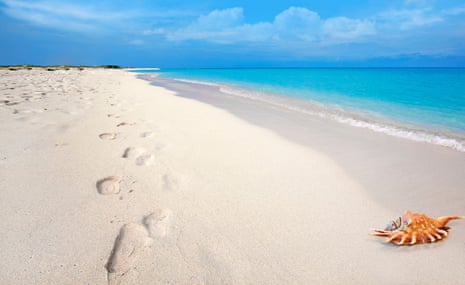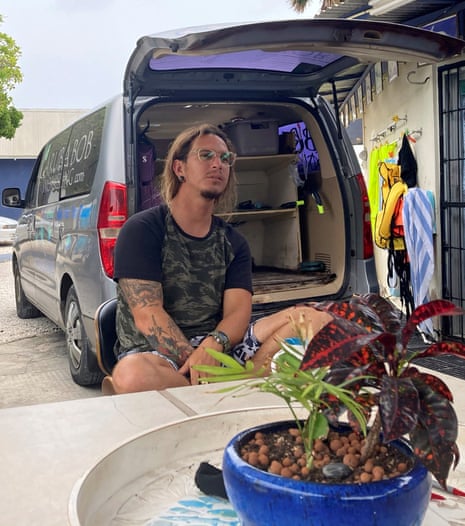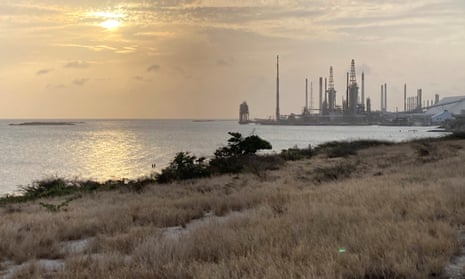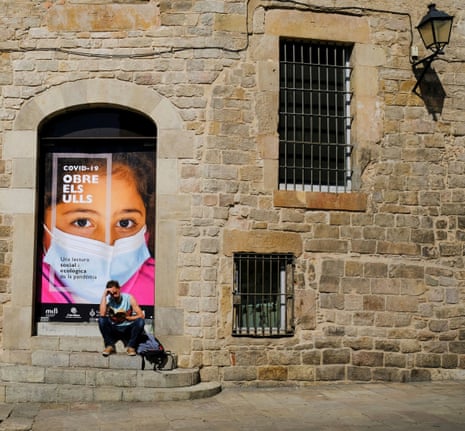This blog is now closed. For up to date coverage of the coronavirus pandemic, head to the link below:
Greece suspends rollout of Johnson & Johnson vaccine – as it happened
This blog is now closed. For up to date coverage of the coronavirus pandemic, head to the link below:
Mon 19 Apr 2021 18.52 EDT
First published on Mon 19 Apr 2021 00.51 EDT- Summary of recent events
- Ireland registers three Covid-19 cases of Indian variant
- Greece suspends rollout of Johnson & Johnson vaccine pending EMA review
- WHO argues coronavirus passports "not be required" for international travel
- India to open vaccine rollout to over-18s
- US widens vaccine rollout to over-15s
- Austria will not use Sputnik V without EMA approval
- Today so far …
- EU may not renew vaccine contract with AstraZeneca over delivery shortfalls
- Greek ship quarantined in Crete after Covid death, infections
- Australian PM flags fast-tracking AstraZeneca vaccinations for over-50s
- Pub and restaurant bosses launch legal battle over England's Covid rules
- New Delhi to impose six day lockdown after India's record case rise
- Indian variant likely to 'become a variant of concern' in the UK – immunology expert
- Cambodia accused of using Covid to edge towards ‘totalitarian dictatorship’
- Hong Kong bans flights from India, Pakistan and the Philippines for 2 weeks
- UK study to expose young people to virus for second time
- India cases top 15m
- Summary

Live feed
- Summary of recent events
- Ireland registers three Covid-19 cases of Indian variant
- Greece suspends rollout of Johnson & Johnson vaccine pending EMA review
- WHO argues coronavirus passports "not be required" for international travel
- India to open vaccine rollout to over-18s
- US widens vaccine rollout to over-15s
- Austria will not use Sputnik V without EMA approval
- Today so far …
- EU may not renew vaccine contract with AstraZeneca over delivery shortfalls
- Greek ship quarantined in Crete after Covid death, infections
- Australian PM flags fast-tracking AstraZeneca vaccinations for over-50s
- Pub and restaurant bosses launch legal battle over England's Covid rules
- New Delhi to impose six day lockdown after India's record case rise
- Indian variant likely to 'become a variant of concern' in the UK – immunology expert
- Cambodia accused of using Covid to edge towards ‘totalitarian dictatorship’
- Hong Kong bans flights from India, Pakistan and the Philippines for 2 weeks
- UK study to expose young people to virus for second time
- India cases top 15m
- Summary
Canada’s federal government has put childcare and Covid-19 relief at the heart of the country’s first pandemic budget, as the governing Liberals announced massive spending plans in an attempt to address growing inequality – and avert a snap election.
Delivering her government’s first budget in more than two years, the finance minister, Chrystia Freeland, on Monday framed the ambitious spending programme as both necessary to combat the disastrous “economic wounds” of the coronavirus pandemic and an opportunity to build a more equitable society.
“We’re all tired, frustrated and even afraid. But we’ll get through this,” said Freeland. “This budget is about finishing the fight against Covid.”
The pandemic forced the government to spend heavily to avoid an economic crisis, and the Liberals have come under increasing pressure to release a financial roadmap for the country’s future:
Ontario’s premier Doug Ford said on Monday the province expects to face a delay in the supply of the AstraZeneca Covid-19 vaccine, dealing another blow to its efforts to contain a punishing third wave of the pandemic, Reuters reports.
“In addition to the delayed and cut Moderna shipments, the Premier was notified today by our officials to be prepared for delays to two shipments of AstraZeneca expected from the federal government later this month and next,” a statement from Ford’s office said.
Canada’s most-populous province said on Sunday it would lower the minimum age for recipients of the AstraZeneca vaccine to 40 from 55.
Ontario announced 4,447 new cases on Monday, with a 10.5% positivity rate and 19 more deaths. The rising caseload - 755 patients in intensive care with Covid-19 on Monday - has pushed the province’s hospitals to the brink.
On Friday, the government announced measures including closing its borders with the provinces of Quebec and Manitoba. But the following day it reversed its decision to close playgrounds and amended its granting of extra powers to police to enforce a stay-at-home order.
Moderna said last week that vaccine shipments to Canada would be cut to 650,000 doses from 1.2 million.
Before Ontario decided to lower the age group for AstraZeneca vaccines, doctors and pharmacists had expressed concern that not enough people were signing up to take the AstraZeneca shot, citing blood clot fears. Two people in Canada have developed clots after receiving the shot and are recovering.
Nadjla Banaei, client care coordinator at the South Riverdale Community Health Centre in Toronto, has had several clients express concerns about the AstraZeneca vaccine.
They may have underlying health conditions and worry about what they have read, she said. “We’ve had several people say: ‘No, no thanks, we’ll wait for Pfizer and Moderna,’” Banaei said.
The move to lower the age group expands the pool of potential AstraZeneca recipients but does not necessarily quell fears around it, she said. “Why did they drop the age all of a sudden? What are we supposed to communicate to people? ... Of course, with all these changes, people are going to be hesitant.”
The federal health minister Patty Hajdu said over the weekend that the provinces were free to offer AstraZeneca to anyone over 18.
Alberta and Manitoba have also said they would lower the age.
The US State Department said on Monday it will boost its “Do Not Travel” guidance to about 80% of countries worldwide, citing “unprecedented risk to travelers” from the Covid-19 pandemic, Reuters reports.
“This update will result in a significant increase in the number of countries at Level 4: Do Not Travel, to approximately 80% of countries worldwide,” the department said in a statement.
The State Department already listed 34 out of about 200 countries as “Level 4: Do Not Travel,” including places like Chad, Kosovo, Kenya, Brazil, Argentina, Haiti, Mozambique, Russia and Tanzania. Getting to 80% would imply adding nearly 130 countries.
Most Americans were already prevented from traveling to much of Europe because of Covid-19 restrictions. Washington has barred nearly all non-US citizens who have recently been in most of Europe, China, Brazil, Iran and South Africa.
The State Department said the move does not imply a reassessment of current health situations in some countries, but rather “reflects an adjustment in the State Department’s Travel Advisory system to rely more on [Centers for Disease Control and Prevention’s] existing epidemiological assessments.” CDC did not immediately comment.
Earlier this month, the CDC said people who are fully vaccinated against Covid-19 can safely travel within the United States at “low risk” but CDC Director Rochelle Walensky discouraged Americans from doing so because of high coronavirus cases nationwide.
“We know that right now we have a surging number of cases. I would advocate against general travel overall,” Walensky said. “We are not recommending travel at this time, especially for unvaccinated individuals.”
A collapse in tourism due to the coronavirus pandemic has sent Aruba toward one of the world’s biggest economic contractions, Reuters reports. It has prompted the island to try to diversify beyond its sun and sand image, namely by restarting a long-idled oil refinery.
Assistance from the Netherlands helped the Caribbean island finance a stimulus program, blunting the impact of the economy’s 25.5% contraction on workers and businesses in 2020. That downturn was behind only Libya, Maldives and Venezuela, International Monetary Fund (IMF) data show.
But those subsidies led to an increase in Aruba’s fiscal deficit to 17% of GDP, according to the IMF, prompting some experts and residents to argue the island should diversify its economy to ensure the government can balance its budget without Dutch assistance.

The 67% drop in tourism arrivals was devastating for small businesses like Aruba Bob Snorkeling, which used to run multiple tours a day before the pandemic hit.
“When Covid came around, they just came crashing down to once a day, once or twice a week, and then to nothing at all,” said instructor and part-owner Jesus Maduro, 30, while sipping coffee under the shade of solar panels in the company’s tree-filled backyard.
But the company kept up rent and electricity payments thanks to quarterly 4,000 florin ($2,247.19) subsidies from the government. Such payments helped keep company closures below 2019 levels, said Martijn Balkestein, executive director of Aruba’s Chamber of Commerce.
As a constituent country of the Kingdom of the Netherlands, Aruba is receiving assistance from Amsterdam. The Netherlands has agreed to cover Aruba’s financing needs during the pandemic contingent on economic reforms, such as cuts in public sector salaries implemented last year.
But Dutch officials have said they ultimately expect Aruba, as well as other constituent Caribbean islands Curacao and Sint Maarten - which are part of the Kingdom of the Netherlands but have autonomy over domestic affairs - to be self-reliant.
Fitch Ratings rates the island’s debt at BB, below investment grade. Aruba in 2012 issued a $253 million bond with a 4.625% yield maturing in 2023.

After closing its borders in March 2020, the island reopened for tourism last June for visitors who present a negative coronavirus test. The country has reported 10,324 Covid-19 cases and 92 deaths.
But the local business community is not banking on an immediate rebound in tourism to restore government finances. The Aruba Hotel and Tourism Association forecasts hotel occupancy will remain at less than half capacity in 2021.
“The pandemic shows very loud and clear to everybody living in Aruba that we cannot rely on one pillar,” Balkestein said.
To that end, authorities are in talks with a US company seeking to build a liquefied natural gas import terminal on the site of an oil refinery that has been idled since 2012. Another company is seeking to restart the plant itself.
In 2012, the refinery’s former operator, U.S.-based Valero Energy Corp, abandoned it over low profits.
Still, some residents hope its revival could change the fortunes of San Nicolas, the rundown refinery town on Aruba’s southeastern tip a half hour’s drive from the glitzy beachfront hotels and casinos dotting the island’s west coast, whose largely empty mural-flanked streets are lined with shuttered dive bars.
“You can see, it’s a ghost town,” said Kendrick Kock, a cell phone repair shop owner who saw sales drop 50% last year, prompting him to lay off his two employees. “If they don’t open the refinery soon, this would be case closed for San Nicolas.”


Following four months of lockdown in Slovakia to combat one of the world’s highest per capita Covid death rates, shops re-opened on Monday bringing crowds onto the streets, AFP reports.
Despite the rainy weather, the streets of the capital Bratislava were filled as residents tried to catch up on shopping after the lengthy closures.
Hairdressers were in particularly high demand. Churches, museums, libraries and swimming pools also re-opened on Monday, as well as hotels.
People still have to wear masks inside shops and have to produce a negative antigen test to enter shops but these documents are now rarely checked.
“In the morning we started to control people but afterwards there were too many of them, so now we do it only randomly,” Marta Juriova, a shoe shop manager, told AFP.
The easing of restrictions comes as the country has recently seen a decrease in new coronavirus cases and deaths. On Monday, it reported 93 new infections, bringing the total to 376,067. The daily death toll was 66, bringing the total to 11,172.
Only weeks ago, Slovakia had the world’s highest rate of Covid deaths per 100,000 inhabitants.
Reuters reports that Switzerland expanded its capacity to inoculate people against Covid-19 on Monday, opening mass vaccination centres in cities including Geneva and Lausanne.
The number of cases has continued to steadily rise in the country over the past weeks. It increased by 4,905 since Friday, according to figures published on Monday, taking the total to 637,304, with 16 additional deaths.
A large vaccination centre opened at Palexpo in Geneva, a convention centre that normally hosts the annual International Motor Show, cancelled this year and last due to the pandemic.
“The centre opens today with a capacity of 2,000 vaccinations per day and as soon as we’re able to increase that, it can quickly go to 3,000 or 4,000 shots per day, that is huge,” cantonal doctor Nathalie Vernaz told Reuters.
In Lausanne, the largest centre in the canton of Vaud opened at Palais de Beaulieu, which aims to vaccinate 14,000 people a week, a statement said.
Summary of recent events
- Ireland has recorded its first three cases of a coronavirus variant first detected in India, a senior health official said on Monday in a statement.
- Greece has suspended its planned rollout of Johnson & Johnson’s single-dose vaccine pending review by the European Medicines Agency on 20 April.
- India will let all citizens aged 18 and over get coronavirus vaccinations from 1 May, the government said on Monday, as cases there surge to record highs.
- The UK reported four coronavirus deaths on Monday – the country’s lowest figure since September, government statistics show.
- The University of Oxford has launched a study wherein participants who have previously had Covid-19 are reinfected with the coronavirus.
- The US has expanded its vaccine eligibility to everyone aged 16 years and above, the country’s health agency said on Monday.
- The head of the World Health Organization (WHO) has said that the world has the means to bring the global Covid-19 pandemic under control in the coming months provided countries work “consistently and equitably”.
- The Democratic Republic of Congo has launched its vaccine rollout via the Covax scheme after it was delayed for more than a month over concerns about the AstraZeneca jab’s safety.
- Austria will not use Russia’s Sputnik V vaccine until the European Medicines Agency approves it, chancellor Sebastian Kurz has said.
That’s all from me for today – handing over to my colleague Lucy Campbell who will guide you through the remainder of the evening.
India will scrap its 10% customs duty on imported Covid-19 vaccines, a senior government official told Reuters on Monday, as it tries to bolster stocks amid a staggering surge in infections.
The government has urged Pfizer, Moderna and Johnson and Johnson to sell their vaccines to India as the it prepares to receive doses of Russia’s Sputnik V vaccine.
The government is also said to be considering permitting private companies to import approved vaccines for sale on the market, with potential freedom to name their prices, the source told the news agency.
Mexico has registered a further 1,308 confirmed Covid-19 cases and 127 more fatalities, taking the country’s total to 2,306,910 infections and 212,466 deaths, according to Reuters.
The government has said the real number of cases is likely significantly higher, and separate data published recently suggested the actual death toll is at least 60% above the confirmed figure.
The government last month acknowledged that the country’s true death toll from the coronavirus pandemic stood above 321,000.
There is a shortage of testing in the country and many Mexicans have died at home without getting a test.
Ireland registers three Covid-19 cases of Indian variant
Ireland has recorded its first three cases of a coronavirus variant first detected in India, a senior health official said on Monday in a statement reported by Reuters.
Cillian De Gascun, the head of Ireland’s national virus laboratory, told journalists at least two of the cases were related to travel.
He said the variant was still classified as a “variant of interest” rather than a “variant of concern”.
The development comes as the UK adds India to its red list for travel amid the variant’s discovery that has seen cases surge. My colleague Ian Sample runs you through what we know about the variant so far:
The University of Oxford has launched a study wherein participants who have previously had Covid-19 are reinfected with the coronavirus, AFP reports:
The carefully controlled study will look at the kind of immune response mounted by the volunteers.
The scientists will know “exactly when the second infection occurs, and exactly how much virus they got,” Helen McShane, a professor of vaccinology, said in a statement. She said the trial “may help us to design tests that can accurately predict whether people are protected” after a prior infection.
Anyone who suffers symptoms will receive the Regeneron antibody treatment used to treat Covid-19 patients.
The University of Oxford’s “first-of-a-kind” tests are funded by the Wellcome Trust.
At the start of the trial, up to 64 fit and healthy volunteers aged 18 to 30 will be deliberately reinfected with the original Wuhan strain.
They will be quarantined for at least 17 days in a special hospital suite, having lung and heart scans. They will then have follow-up appointments and be monitored for a year.

In the UK, tens of thousands of people did not claim universal credit during the early part of the pandemic because they felt too ashamed to sign on benefits, often despite struggling to pay rent and bills, a study has found.
The perceived stigma around benefits – with some people feeling, for example, that they were for “dole scroungers” and “freeloaders” – meant many refused state help, or put off making a claim until they ran into serious difficulty.
Even more didn’t lodge a claim because they said they didn’t need benefits, thought the online-only benefit was too confusing or too much hassle, or because they believed – wrongly – that they would not be eligible.